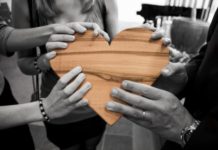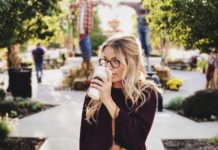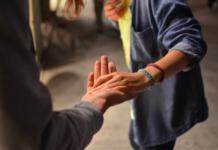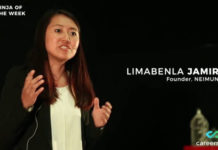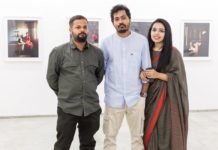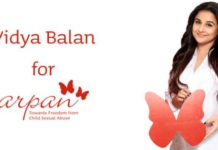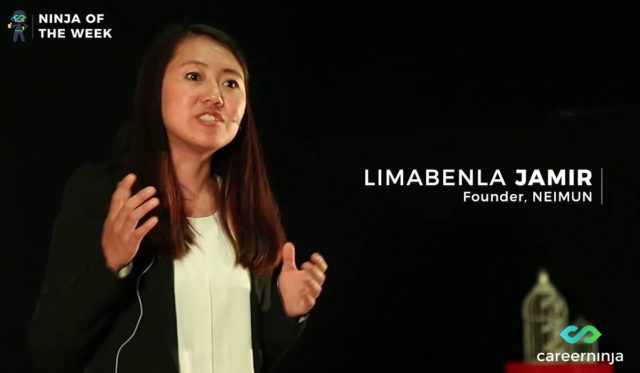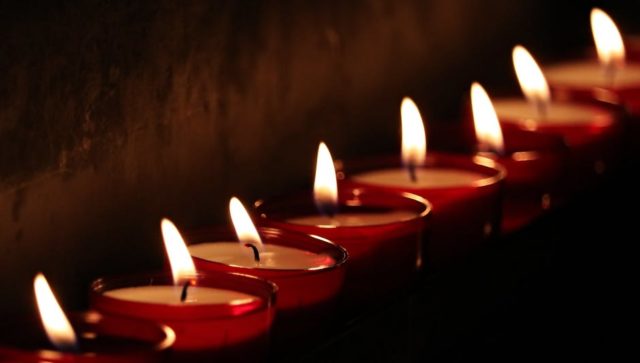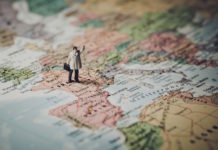A Rotary Peace Fellow, Duke University, 29-year old Limabenla Jamir is the founder of NEIMUN, a youth led non-profit educational foundation building leadership skills in the youth from the North East of India
Growing up in a small town in Nagaland, Limabenla Jamir witnessed and experienced armed conflict and its devastating effects on the social and psychological lives of the locals in Nagaland. This life-changing tragic experience fueled a passion in her to start a youth movement, promote peace and train young people to address conflicts in her region.
She is the founder NEIMUN, a youth led non-profit educational foundation, a Rotary Peace Fellow, TedX Speaker, a World Economic Forum Global Shaper, and Founding Curator of the Global Shapers Kohima Hub.

Limabenla at NEIMUN and at the World Economic Forum
In conversation with Limabenla Jamir –
What is it that you do?
Currently, I am pursuing a Masters in International Development Policy at Duke University.
Over the past six years, I’ve been facilitating opportunities made for young people in North East India to learn more about the work of international organizations on youth, peace and security. The goal is to initiate socio-economic transformation in their communities, together with educational institutions, government, and international organizations.
You’ve witnessed armed conflict firsthand as a child. Could you tell us what happened in 1994?
Growing up in Nagaland before the Indo-Naga Ceasefire Agreement in 1997, we encountered several events that were not very pleasant. One of the most significant events was Dec 27, 1994 and I have to admit, that is the inspiration for everything I do today.
Nagaland, is a small state in Northeast India. Many refer to this region as an anthropological paradise. It is home to over 200 ethnic tribes with many beautiful cultures, and definitely beautiful hills, lakes and people too.
But the region is infamous for another issue too- it hosts one of the longest unresolved armed conflicts in the world.
I remember Dec 27 like it was yesterday. I watched our car burn together with many others, hundreds of shops being burnt, men, women, and kids (our family included) lying down on the road for hours as we were caught in a crossfire between the Indian Army and the Naga insurgent groups.
I discuss about this event so frequently because that ignited my passion to learn more about political conflicts.
How did people react to this incident?
This incident was never recorded. It remained untold, unseen, forgotten by the rest of the country. So are the thousands other untold stories of people from my region; of brothers being killed, sisters being raped, parents being shot or kidnapped.
These incidents remain vivid in our minds.
But in my region, we don’t talk about these experiences. I don’t know if we’ve moved on, forgiven, or simply accepted our fates. But one thing I’ve learned from this experience and living in Nagaland is the resilience that our people have developed. It’s the resilience that gives us the strength to withstand these disturbances caused by the terrors of armed conflict and cope with our environments.
Is that why you pursued a university degree in psychology and sociology?
Having experienced the consequences of armed conflict first hand, I have always been curious about human behaviour in intense situations.
I was curious why the Indian army, the Indian and the Nagaland governments or the insurgent groups would do what they are doing. That fascinated me and encouraged me to pursue psychology.
How did you end up going to London to do your Masters?
When I finished my undergraduate studies from the University of Delhi, I wanted to take up a Master’s course. I sought to understand political conflicts through a social psychology perspective.
After my Bachelor’s degree, I was working at the UNHCR-YMCA refugee assistance programme, a six-month posting, after which i started working on my application. I was fascinated by the Applied Social Psychology program at Royal Holloway, University of London and I feel very fortunate to have the opportunity to be taught by some incredible Social Psychologists.
I didn’t get a full scholarship for this course, and so I worked part-time in London to sustain myself.
After finishing your studies, you came back to Nagaland. How did you feel going back home? Had things changed?
During my studies, I attended numerous international workshops and conferences and training. All these forums had a common thread – a call to young people to voice their opinions and participate in decision-making processes to make a difference in our communities. These experiences were eye-opening and filled me with a lot of hope and ideas.
But when I came back home, my return was discouraging and disappointing.
“Once you experience living in a first world country, i think there is a higher tendency to compare and see what we lack.”
But lessons from my higher education in Delhi and London allowed me to understand the development gaps in my state. What struck me the most was the high rates of unemployment, helpless young people, and the lack of opportunity because of the political and economic instability in our region.
The most discouraging factor was seeing young people losing faith in their capabilities and potential.
So what did you do in face of such disappointments?
Although I was disappointed, I also met inspiring young people who were challenging the system and making it big nationally and internationally. I met like-minded people and together, we founded a few programmes – community hubs and training platforms for young people in the North East.
Why did you start NEIMUN?
In 2013, I returned home and founded the North East India International Model United Nations (NEIMUN), a non-profit educational foundation, designing and piloting a culturally tailored program for young people in Northeast India. This was an outcome of my Master’s thesis on conflict, fear and identity, which showed declining levels of self-esteem, life satisfaction and general mental health among those affected by conflict.
“Young people have the desire, ability, and drive to challenge the system and implement changes to make things better for the society. What we lack isn’t the motivation, but an environment that equips young people, opportunities that invites young people to be a part of decision-making and policy-making processes to join governance and rebuild conflict-affected societies.”
NEIMUN seeks to create such.a platform to share our struggles and stories, build our skills, strengthen our self-esteem, improve our life satisfaction, and allow us to shape our future.
That’s why I started NEIMUN.
What does NEIMUN do?
NEIMUN conducts youth policy research and advocacy, and facilitates opportunities for young people to learn more about the works of International organizations, social issues, peace and security and initiate socio-economic transformation in their communities. Since inception, NEIMUN has been actively involved in conducting Model UN conferences, during which, participants come together to discuss, debate and pass resolutions. The conferences are held annually across the region.

Source: Northeast Window
At the NEIMUN conferences, we bring together passionate young people from across Northeast India to learn about leadership, diplomacy, negotiation and learn how to make a difference in their communities Their stories, their dreams and our common hope to address the challenges we face in our region are truly inspirational.
What problems did you face while starting your own organization NEIMUN?
Just convincing people was hard as I was not doing the Civil Services exam but building an NGO. A 23-year old girl asking in your office asking you to invest in her organization and her work wasn’t something that people here found convincing.

Source: NEIMUN
But my friends and I kept going, sharing our stories wherever we went. This impacted and majorly influenced the decisions of others who started supporting us. That’s why we built NEIMUN around our stories. NEIMUN happened because there was a group of passionate young people who wanted to take it forward. Even today, there are young people who believe in its mission and they’re the ones who’re taking it forward.
What’s next for your organisation NEIMUN?

Source: NEIMUN
Ultimately, I want to facilitate more conversations between people from Northeast India and the rest of India and the world. We hope to involve young people across the country in dialogues to improve our grim realities and build a better future for our regions and our country.
Tell us about an incident that’ll stay with you from your work experience?
At one of the conferences that I was attending, a young person shared his story.
“I had lost someone close in the 1999 Kargil War. After that, every time I thought about the war, about Pakistan, I was filled with anger and rage. But after studying the impacts of conflict on a region like Pakistan, I realized that the challenges that we face in Nagaland and the challenges that they face in Pakistan are similar. Both are conflict-ridden regions. Young people in Pakistan aspire for the same future that I do – a safe future. The anger and frustrations that I held against them no longer exist.”
This story moved me and will stay with me forever.
Currently, you are at the Duke University in the USA pursuing a Masters degree on a scholarship. How did you manage to get a scholarship?
10 years ago, I started reading about opportunities to study around the world. I was naive and ambitiously dreaming of studying abroad. One feature that I constantly saw in the requirements was the holistic approach that all universities have. So during my undergrad and masters, in addition to getting a good score, I worked on extra co–curricular activities. I always took up volunteering opportunities, kept building my profile and kept looking of opportunities where I could contribute significantly and learn from.
During one such opportunity, I met a law professor from Mumbai who sent me the link to the Rotary Peace Centre Fellowship in 2015. The fellowship required at least 5 years of relevant work experience, in addition to good academics.
I wasn’t ready then. I also looked at other scholarships such as Fulbright, Open Society, Tata trust funds, and I ended up making a whole list because I had been searching for years. I applied to several top universities and got several rejection letters.
In 2017, I finally applied to the Rotary and received a full fellowship to study at Duke.
I chose Rotary because of their focus on international development and peace-building. As a Rotary Peace Fellow and a Master’s in International Development Policy candidate at Duke University, I am looking forward to exploring the complimentary nexus between economic development, security and policy making. I hope that my time at Duke will equip me to understand more on applied policy research and analysis and contribute in strengthening governance institutions, and civil society in conflict-affected and post-conflict settings.
I am passionate about exploring the role of leadership in peacebuilding, transparency and accountability mechanisms in public institutions and promoting resilient societies.
You said you have received several rejection letters. What kept you going? What did you learn from these bad experiences?
GRIT. This kept me going. Those were tough days.
“The rejection letters pushed me down, made me feel as if I was incompetent, dreaming too high, being impractical and unrealistic. But my friends and family helped me sail through this period.”
During this period, I received more reviews about how the youth organization has been helping young people challenge themselves and strive for bigger things. I think these reviews reaffirmed my vision and mission. I think going back to people and books that inspired me really helped me understand my purpose.
“With or without a degree I was set out to try my best to be the small change.”
Those rejection letters did not stop be from applying to more fellowships and to more schools. While I felt incredibly passionate about the work I did and strongly believed in its impact, I also began to observe the risks and limitations I had to generate the kind of impact I wanted to have. I knew I had to learn and study more. But with every application, I was stronger and confident that the outcome will not define my success.
What did you learn from your experience applying to universities abroad? What truly matters in an application?
To be honest, tips to apply abroad will be another long conversation. But there are so many very valuable resources that students can refer to. I frequently used Happy School blogs, the grad café. It’s important to research well before applying to schools in the UK and the USA. I haven’t applied to other countries, so I won’t be able to share much about that.
“The foremost is presenting very well in your application why you want to study a particular course in that university. You don’t have to be wealthy, nor a super achiever, to get into these schools.”
It took a lot of introspection, writing my statement of purpose and identifying the fellowships and schools I could apply to.
What you need is to show who you are, what you’ve done, and where you want to go. I certainly am not an overachiever, nor do I have high grades, and neither do I come from a wealthy family. My application showed the person I am, the kind of work that I have done, the kind of impact I plan on generating after finishing my studies, and how true I was to my vision and goals.
Were you always sure about your true calling in life?
I certainly didn’t know what was my true calling in life was, because it kept evolving. But one thing I am confident about is that I want to glorify God in everything I do and make any small change in the community in whatever capacity I can.
“When the media tells you stories of super high achievers in their early 20s, in their teens, you often end up feeling as if you have achieved nothing. That you are a nobody.”
But that’s not true.
Everyone has done a lot; some end up being more visible than the others. Also, the way everyone’s success is measured is different. Some people are meant to start companies at 25, or maybe graduate at 35. No achievement is less significant than the other.
What did you do in your moments of uncertainty? When you weren’t sure what you wanted to do?
Whenever I had moments when I wasn’t sure, I always liked to revisit what inspired me – a book, a person, a movie, a moment from my life. Remembering what inspired me always helped me reconnect with myself.
What are the biggest challenges you faced along the way? How did you overcome each of those challenges?
The first challenge was overcoming the collective delusion that only certain careers are worth pursuing or will define your success.
In Nagaland, you’re considered successful only if you clear the UPSC and get a government job. That’s how you can be in power and achieve success. If you work for an NGO or the private sector, you’re not considered to be successful. So, it was not easy to challenge the status quo.
I was told 23 was too young to start an organization, that going back to school at 28 for double masters is crazy. But I realized that success has different meanings and different definitions.

Source: NEIMUN
Surrounding my life with a few people – parents, mentors (both juniors and seniors), friends and cousins who understood my unique journey and believed in me helped me sail through the tough times.
The second was maintaining a fine balance between work, family, studies and well-being. There were days when I was so occupied with work and studies that I missed out on enjoying the little joys and happiness of life. I have understood the impact of healthy well-being and good mental health on productivity.
How do you push through your worst times?
What always helped me were prayers, a quick run and spending time with family and friends.
Looking back to everything you have achieved, how far do you think you’ve come?
I feel like it’s a miracle. I feel very grateful that I got these opportunities. However, with that, comes a great responsibility, to use what I learn to come back and make a difference. I hope to finish what I’ve always set out to do.

Source: Global Shapers
What are you most proud of?
The opportunity to inspire people through my journey.
A quote that inspires you.
“I learned that courage was not the absence of fear, but the triumph over it. The brave man is not he who does not feel afraid, but he who conquers that fear.”
– Nelson Mandela
What advice would you give to our readers?
If something is meant to be, it will happen, but not overnight. Make sure that at every stage in your life, you identify your skill sets, you understand your environment, and you keep doing your best. It’s never too late.
Also accept that while it’s great to have your fire burning all the time, your zeal and passion coming through every day, you might not have it in you every day. And that’s okay. No matter what, keep walking. Remember GRIT.
Above all, no matter what you do, don’t forget to take care of your emotional and mental health.
Found this interesting? Check out how 28-year-old Soumya Sankar Bose is documenting stories of vulnerable Indians forgotten or shunned by the society.



